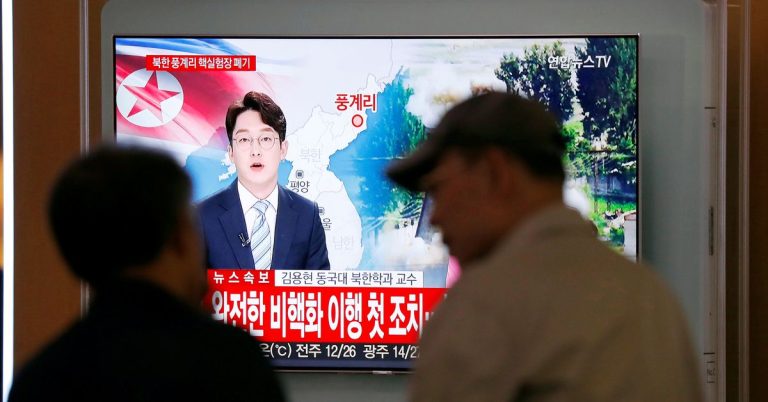SEOUL (Reuters) – Tens of thousands of North Koreans and citizens of South Korea, Japan and China could be exposed to radioactive material spread through groundwater from an underground nuclear test site, a Seoul-based human rights group said in a report. Tuesday.
North Korea secretly conducted six nuclear weapons tests at the Punggye-ri site in the mountainous North Hamgyong Province between 2006 and 2017, according to the US and South Korean governments.
The study, conducted by the Transitional Justice Working Group, said radioactive material could spread across eight cities and counties near the site, where more than a million North Koreans live and where groundwater is used for daily life including drinking.
It also said that neighboring South Korea, China and Japan could be at risk because of smuggled agricultural and fish products from the North.
Latest updates
View 2 more stories
The group, which formed in 2014, worked with nuclear, medical and dissident experts and used open source intelligence and publicly available government and UN reports for the study, which was supported by the National Endowment for Democracy, a US-funded nonprofit. Congress.
“This report is important in showing that North Korea’s nuclear tests can threaten not only the right to life and health of the North Korean people, but also of South Korea and other neighboring countries,” said Hubert Yong-Hwan Lee, a member of the group. Chair and co-author.
Phone calls Reuters made to North Korea’s diplomatic mission to the United Nations in New York were not answered.
In 2015, South Korea’s Food Safety Agency detected nine times the record level of radioactive cesium isotopes in imported hedgehog mushrooms that were sold as a Chinese product even though their actual origin was North Korea.
China and Japan have stepped up radiation monitoring and expressed concerns about possible exposure after North Korea’s previous nuclear tests, but have not publicly provided information on contaminated food.
Many outside experts have raised concerns about potential health risks from polluted water, but North Korea has dismissed those concerns, saying there was no leakage of harmful materials after previous nuclear tests, without providing evidence.
When North Korea invited foreign journalists to watch the destruction of some tunnels at a nuclear test site in 2018, it confiscated their radiation detectors.
Seoul’s Unification Ministry, which handles inter-Korean affairs, has stopped testing defectors for radiation exposure since 2018 amid a thaw in cross-border relations.
But of the 40 defectors from areas near Punggye-ri who were tested for radiation in 2017 and 2018, at least nine showed abnormalities. The ministry said, however, that it could not establish a direct link with the nuclear site.
The report stated that more than 880 North Koreans have fled those areas since 2006.
The rights group urged a resumption of testing and an international investigation into the radiation risks to communities around Punggye-ri.
The Unification Ministry said it would consider retesting if any defectors reported health problems and sought support regarding radiation exposure.
Seoul and Washington have said Pyongyang may be preparing for a seventh nuclear test.
Reporting from Hyonhee Shin. Editing by Simon Cameron Moore
Our Standards: The Thomson Reuters Trust Principles.

